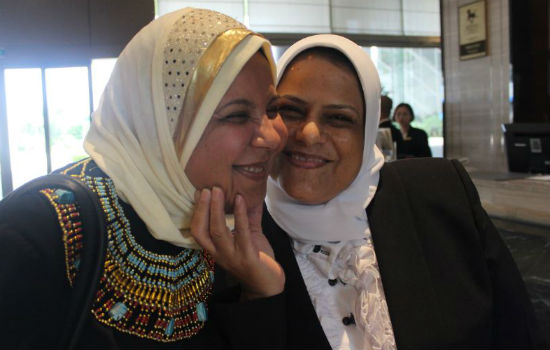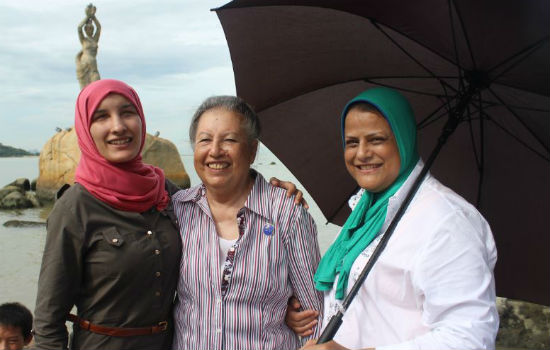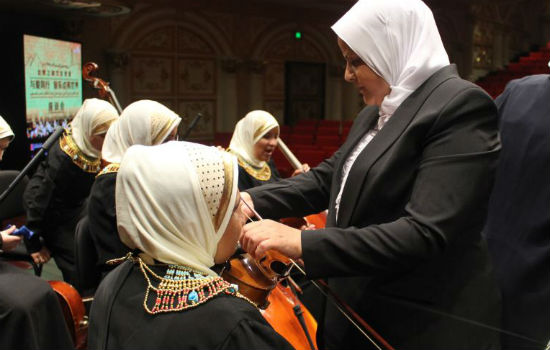In among the fascinations of the wide world of music, we follow programmes and orchestras, applaud musicians and conductors. But beyond the artists and the halls, beyond the obvious final product, there are people who facilitate the magic. Yet the limelight never falls on them, and so we never see them. The media rarely talks about those without whom a musician, an orchestra or any other artist would find it next to impossible to impress their audience.
Among the hundreds behind the scenes who make a significant contribution to music, allow me to introduce Nagat Radwan, the executive manager of the Al Nour Wal Amal Chamber Orchestra and its Music Institute.
Radwan is an indispensable support in all the administrative and organisational tasks of the orchestra and the Al Nour Wal Amal Association, an institution that cares for, educates and empowers blind and visually impaired girls and women. In the association, one can spot Radwan behind the computer with a pile of papers on her desk which she sorts through while answering the phone, which never stops ringing. And since she is hardly ever still, it is also likely that you’ll find Radwan moving energetically across the corridors of the Al Nour Wal Amal Association, occasionally stopped by one of the girls who whispers something into her ear, or hugs her emotionally.
Radwan is equally dynamic when it comes to carrying her mysterious, masculine briefcase as she flits around the city, visiting institutions and officials linked to the association and the orchestra. The briefcase will occasionally open to reveal tickets and passports at the airport or at hotel receptions during the troupe’s many international tours.

Nagat Radwan [R] and violinist Basma [L], the Al Nour Wal Amal Orchestra's leader (Photo: Ati Metwaly)
As Amal Fikry, the vice president of Al-Nour Wal Amal Association and the main dynamo behind the orchestra, says, “Nagat is unconditionally dedicated to the work and to the girls and women of the orchestra. I would ask her to take some rest but in vain. She is our general.” Fikry makes it clear, however, that Radwan is as much a personal coach as an organisational leader.
“Nagat is not an employee of the association, she is a part of us and of our success,” violinist Shaimaa Yehya comments.
And it’s true. Further discussions with the girls reveal that Radwan is also a friend, a sister and a mother to them. She has been present all through the years of their artistic and personal growth, a confidante for their deepest secrets, a shoulder to lean and cry on, and a personal as well as professional problem-solver.
“I was 10 years old and Nagat was next to me every day when I was in hospital, as much as my own family. She took very special care of me when, as a teenager, I travelled with the orchestra for the first time,” violinist Maryam recalls.
Other women of the orchestra also mention Radwan’s healing role in the problems they encounter with often conservative parents, fiancées and husbands who might object to aspects of their musical life. Radwan is as much a part of the orchestra’s artistic side, its international renown and travels as she is of the musicians’ own lives.

From left to right: violinist Maryam; Amal Fikry, vice-president of Al Nor Wal Amal Association and the orchestra's main dynamo; Nagat Radwan. Zhuhai, China (Photo: Ati Metwaly)
Coming from the Nile Delta city of Banha, from a family that boasts neither visually impaired people nor musical practitioners, Radwan’s strong bond with the institute might seem surprising. Her relationship with Al Nour Wal Amal Association began in the first year of her studies at Al-Azhar University in Cairo.
“I remember very well,” she recalls. “It was 6 October 1989 when I visited the Al Nour Wal Amal Association the very first time.” It was her sister who introduced her to the institution, which soon became her second — perhaps I should say her first — home, since no home could boast as much of an emotional investment or love for the girls.
“When I saw the girls, I felt immediately attached to them. I knew I couldn’t leave them. I was also surprised by how independent they were. They are so natural...”
It didn’t take Radwan long to shift to the association, living there during her studies, learning about the girls and the work, which helped to reassure her family of her safety in the capital. She became obsessed with the girls.
“At the beginning, I had many moments of confusion. I would try to imitate them, walk with my eyes covered to understand their life and behaviour.”

Two musicians from Al Nour Wal Amal Orchestra kiss Nagat Radwan while posing for the photos at Hong Kong's harbor (Photo: Ati Metwaly)
As the relationship grew, Radwan would always take one or more girls to spend the weekend with her family in Banha. Only a few years later, her family home would become a “stop for lunch” for the whole group on their way to Alexandria where they used to attend intensive music camps. “We would take the agricultural road from Cairo to Alexandria so that Banha could be on the way,” Radwan smiles.
The strong bond based on mutual love between Radwan and the girls became a matter of course, spreading to the new generations coming to the association.
“In the first few years I was responsible for the girls in the Al Nour Wal Amal’s primary and secondary schools. Madam Amal Fikry taught me a lot about the girls, their characters, and about the work. Gradually, I began to spend more time with the orchestra, where I learned a lot from maestro Ahmed Abul Eid,” the orchestra’s first conductor, music director and mentor.
Radwan attended all the rehearsals and concerts, and Abul Eid told her all about the music and the instruments, their structural and aural characteristics. “He taught me how to fix small things in the instruments and even introduced me to reading the score. If only I had paid more attention to his teachings about music notation,” she sighs. Yet such characteristic timidity conceals her command of the basics.
Before the concerts one can see Radwan moving around the orchestra with the tuner before she retreats backstage, leaving the floor to the maestro and music. As the orchestra plays Radwan’s face, just like a mother’s, fills with pride, and she applauds vigorously after each performance.

Nagat Radwan helps tuning the instruments before the Al Nour Wal Amal Orchestra's concert in Zhuhai, China (Photo: Ati Metwaly)
Music has also become Radwan’s life and today it is hard for her to tell which composition she likes the most. She loves them all, from Mozart to Brahms to Tchaikovsky, from Mohamed Abdel-Wahab to Rageh Dawoud. “I love the girls and my love for the music they play is a natural extension of that relationship,” she says casually, as if unaware of the emotional power of her words.
Radwan never raises her voice; her calm demeanour has become her hallmark. During travels when organising a busy schedule of rehearsals, concerts, relocation, accommodation, it is probably her serenity that enables Radwan’s instructions and call for discipline to sound so maternal, making her at once the girl’s mother and the general of whom Fikry speaks.
The girls do not like to upset or overwhelm Radwan and at times of pressure at work, they conceal their personal problems, something that tends to anger her. Even today, when she has her own children, this motherly attitude towards the musicians continues and prompts her to be there once the young girls or the older women need her, at any point of the day or the night, regardless of what she might have on her hands.
Throughout those years, she seems to have developed on the personal level, learning a lot about music and the new cultures to which she is exposed on each new tour. And as her journey with the musicians continues, she passes the same values to her own children, stressing the way classical music has changed her.
“The girls have taught me so many layers of love and care. They have made me look at life and people from new and pure perspectives; while travelling has opened up a whole world of unique qualities and beauties to me — and it’s all thanks to the music. Music is such a wonderful thing and Western classical music is so unique and beautiful, it’s become a very important part of our lives. Only when you experience it will you know its power.”
This article was first published in Al Ahram Weekly
For more arts and culture news and updates, follow Ahram Online Arts and Culture on Twitter at @AhramOnlineArts and on Facebook at Ahram Online: Arts & Culture
Short link: